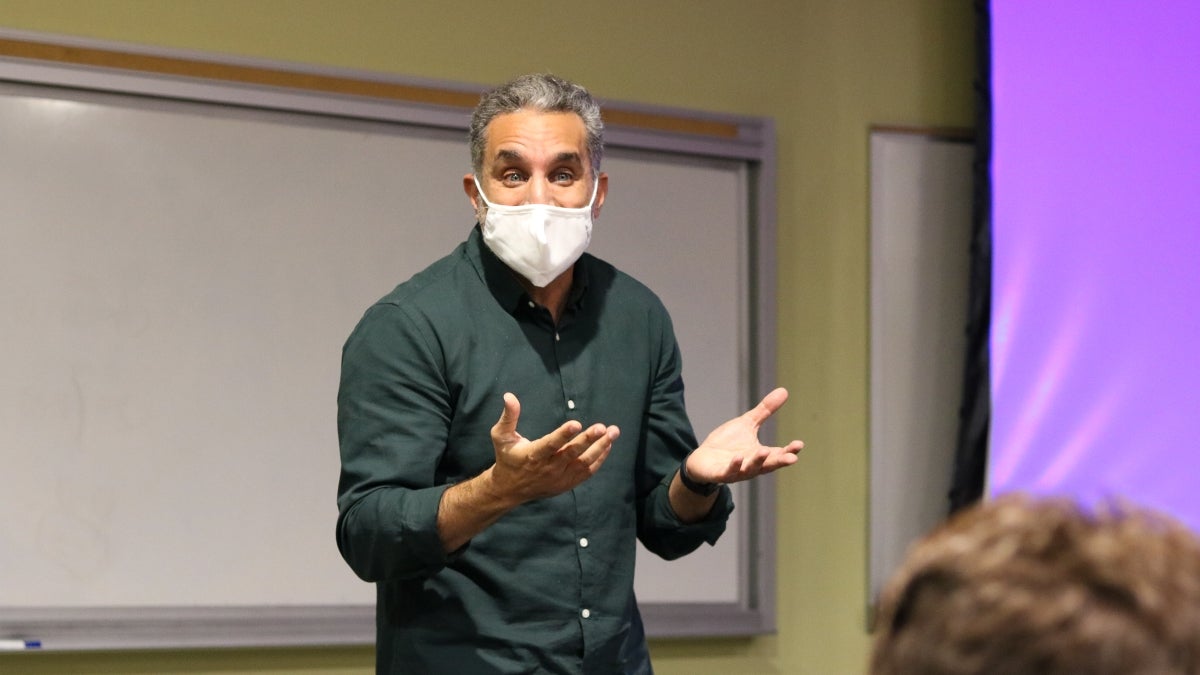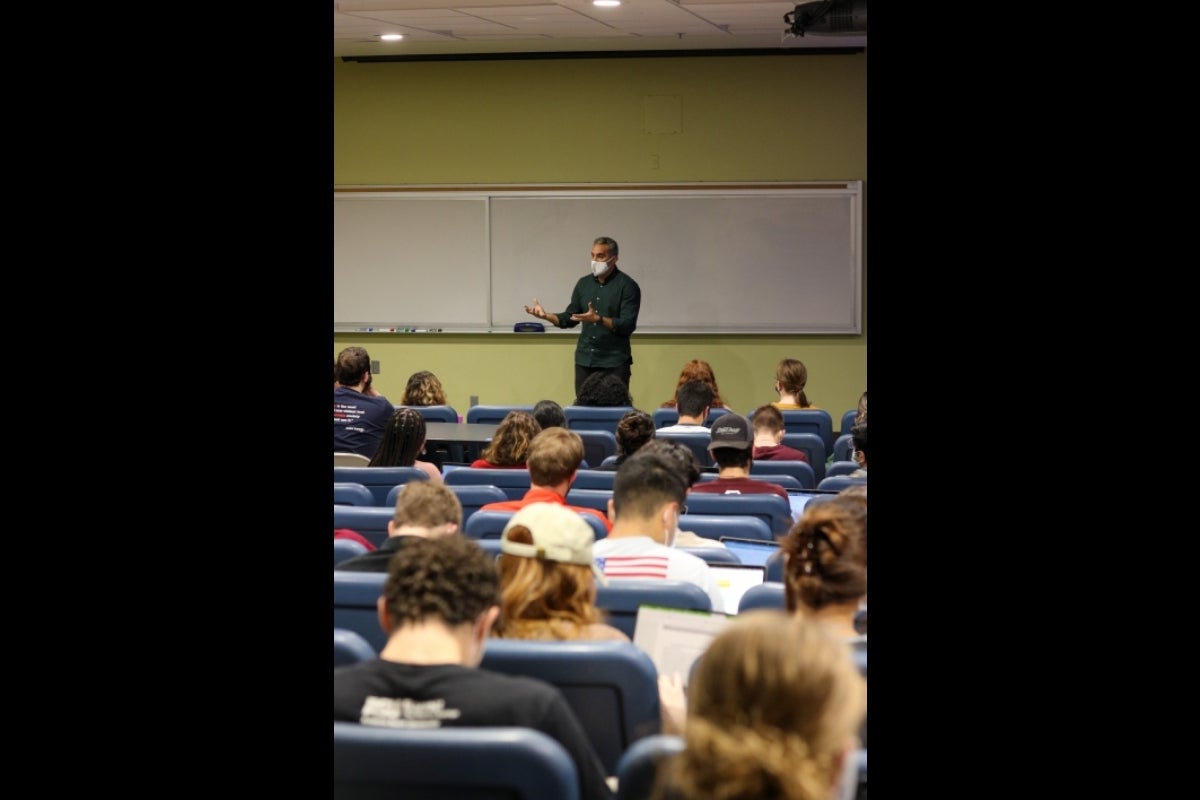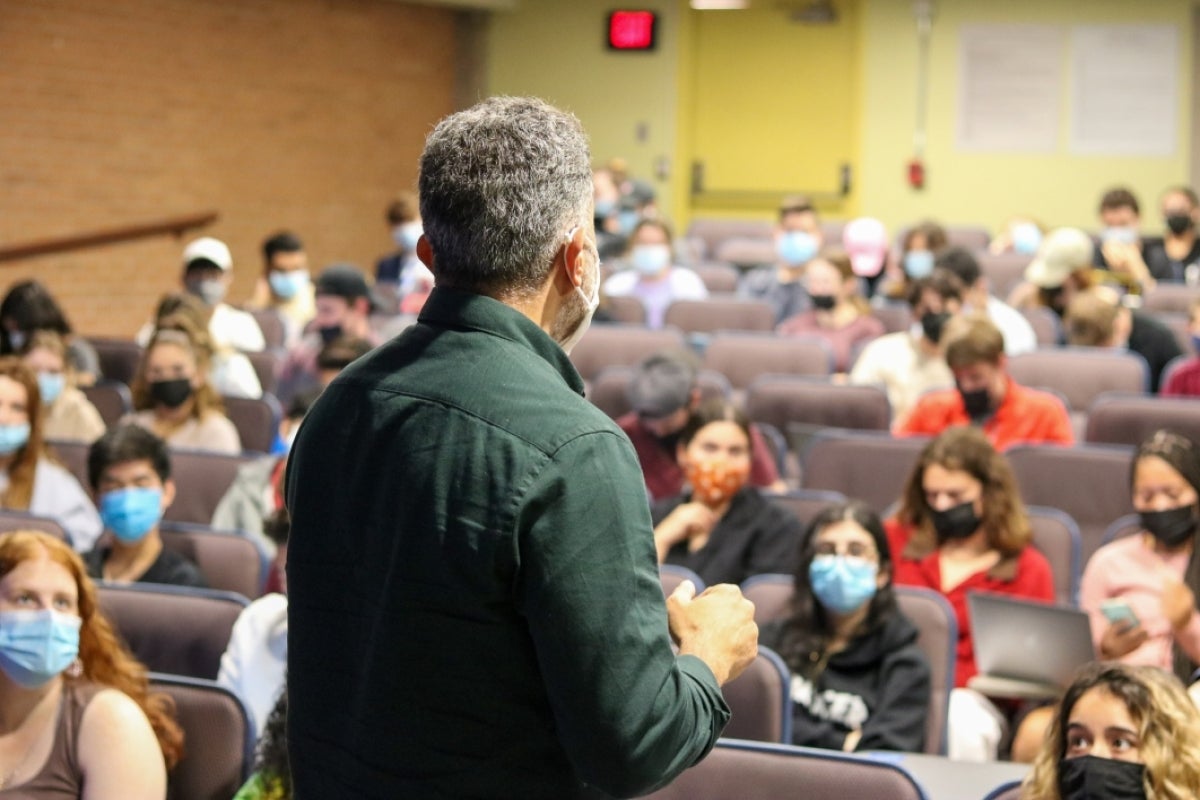Bassem Youssef visits ASU political science class

Bassem Youssef, who will be performing at ASU Gammage in 2022, spoke with students in a School of Politics and Global Studies course on Oct. 14.
Bassem Youssef is no stranger to politics. His political satire show "AlBernameg," which was similar to that of Jon Stewart’s "The Daily Show," averaged 30 million viewers a week in Egypt.
In January 2022, ASU Gammage will be hosting Youssef as part of their Beyond series, which features artists that bring national and global perspectives. On Oct. 14, he was a special surprise guest in the fifth annual ASU Gammage Beyond Series Preview Night.
“(Youssef) is a brilliant commentator on societies and political structures, and he happens to do that through brilliant comedy,” said Michael Reed, senior director of programs and organizational initiatives at ASU Gammage.
“We always try to bring really compelling, multiple perspectives to the Beyond series from very accomplished world-renowned artists, and he fits all of those bills.”
In 2011, the Arab SpringA wave of pro-democratic protests, revolutions and civil wars that have swept some Arab nations since 2011. arrived in Egypt and protesters took to the streets seeking the overthrowal of their president of 30 years, Hosni Mubarak.
In response to the political turmoil, Youssef, who was a practicing surgeon at the time, created short satirical YouTube videos from his house focusing on the Egyptian government. His meteoric rise in popularity led to an offer from an Egyptian TV network to create "AlBernameg."
Although nearly a third of the country’s population watched the show, the leaders of the Egyptian government were not fans, and in 2013, public prosecutors ordered the arrest of Youssef for insulting the president and Islam.
As tensions continued to rise, Youssef decided to leave for the United States to continue his comedy career.
While in Tempe, Youssef visited School of Politics and Global Studies Instructor Daniel Pout’s comparative government class.
Reed said that ASU Gammage always finds a way for the Beyond series artists to engage with students and that Youssef, in particular, provides an informed perspective regarding some of the political and philosophical challenges the U.S. and globe faces.
“He is able to do all of this in the medium of comedy,” Reed said. “(Youssef) can probably help bring people together a little.”
Arizona State University students in Pout’s class asked Youssef questions on topics ranging from authoritarianism to fake news to political comedy.
Youssef reassured students who asked if the United States showed authoritarian trends. From his perspective, the country has a critical mass that would stand against it. He shared that this was not the same experience in the Middle East, which was often under military and religious rule.
“The independence that the states have here that can actually stand in the face of a centralized government decision is a huge safety valve for you,” Youssef said. He joked that his response to Americans who are unhappy with the national government would be: “Dude, I’m in California. I don’t care.”
Students also asked Youssef about his thoughts of state-run media, to which he noted the commonality across cultures is the state-media’s use of fear and how it points blame for problems on certain groups.
“People will always choose security over democracy and freedom,” he said.
He continued that when countries around Egypt were falling apart, the state media would ask, “Do you want to be like Syria? Do you want to be like Libya?” Youssef joked that this happens in America as well, whether it’s “war on Christmas” or “brown people are replacing us.”
Youssef also discussed cancel culture and the idea of certain demographics and topics being off-limits to comedy. He emphasized that although power dynamics play a role, nobody should be immune to satire and comedy, even if it's offensive.
“Where do you draw the line? And most importantly, who draws the line? Because whoever draws the line has the power to make the line recede,” Youssef said.
The dynamic of how political comedy might vary across ideologies was also covered. Youssef shared that, in the Middle East, he saw comedians sponsored by the government but that it was “terrible comedy.”
“In my opinion, comedy is supposed to be subversive,” Youssef told the class. “It makes you laugh because it surprises you. When you hold certain things sacred, it is a way to control people — whether that is religion, sex or politics. It is not really like left versus right. It is more about using comedy to break down taboos.”
One student asked about the negativity of the news and if that affects him as someone who needs to be informed as a political comedian.
“Absolutely,” Youssef answered. “That is why you make fun of it. That’s the only way that you survive. You make fun of how people respond to it — how they spin it.”
Youssef said his upcoming show at ASU Gammage is a two-act stand-up performance covering his life as a doctor in Egypt during the revolution and as an immigrant coming to America during the current political climate.
“It is more of a human experience," he said. "It’s not your usual stand-up where you just say jokes. It’s my personal story, and I think it’s a story that could be relatable to everybody.”
More Law, journalism and politics

ASU Law to offer its JD part time and online, addressing critical legal shortages and public service
The Sandra Day O’Connor College of Law at Arizona State University, ranked 15th among the nation’s top public law schools,…

ASU launches nonpartisan Institute of Politics to inspire future public service leaders
Former Republican presidential nominee and Arizona native Barry Goldwater once wrote, "We have forgotten that a society…

Annual John P. Frank Memorial Lecture enters its 26th year
Dahlia Lithwick, an MSNBC analyst and senior legal correspondent at Slate, is the featured speaker at the School of…

